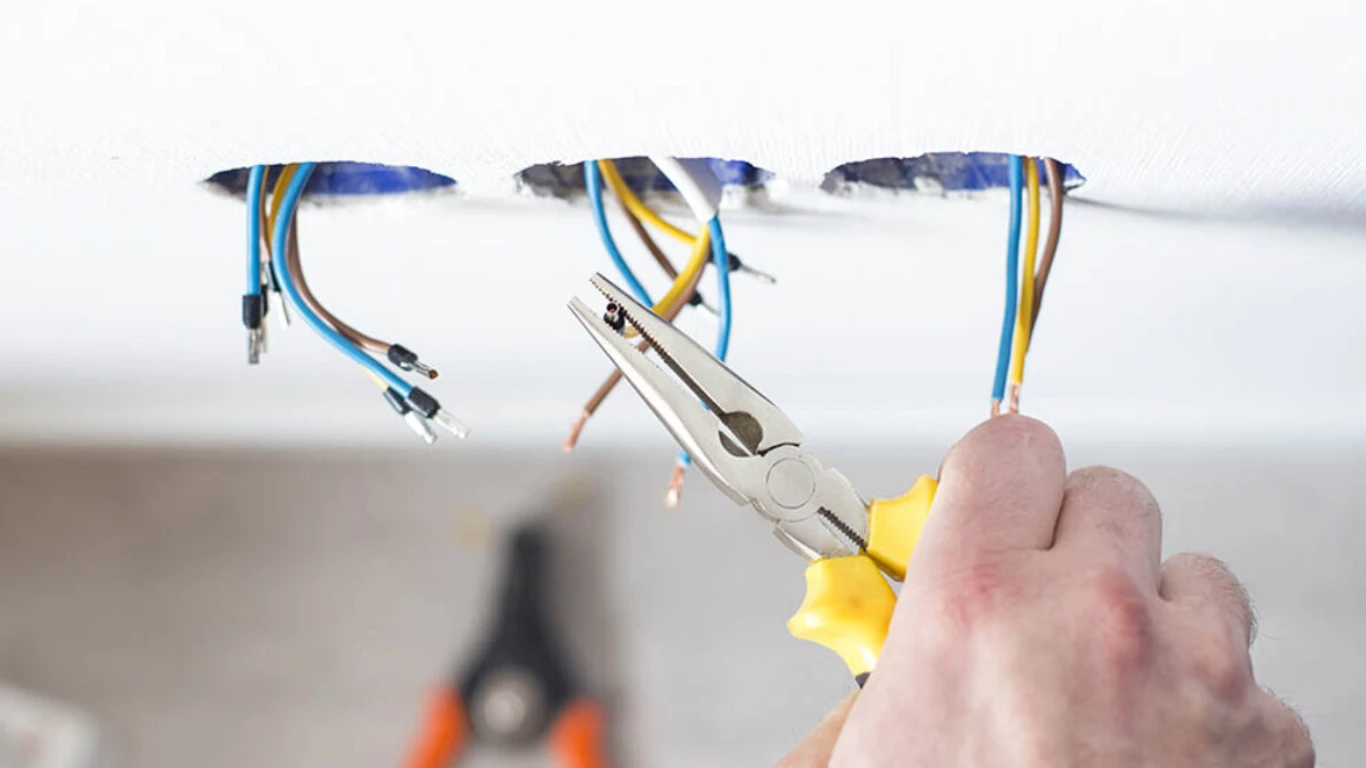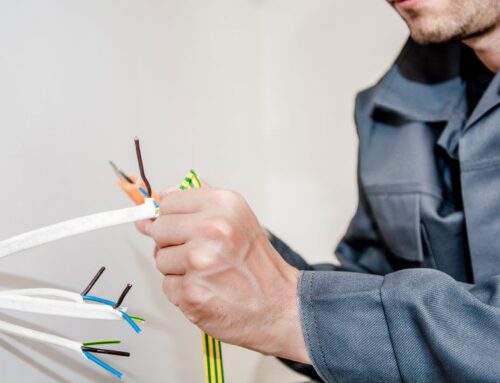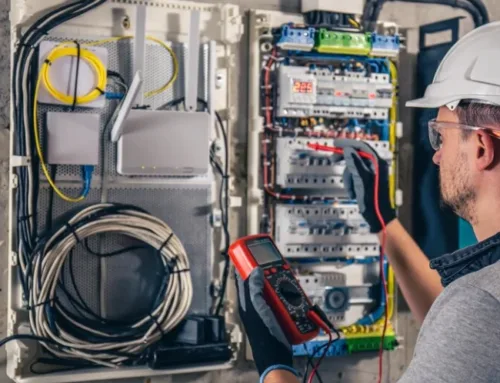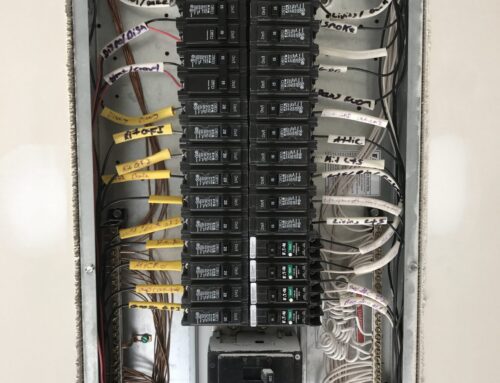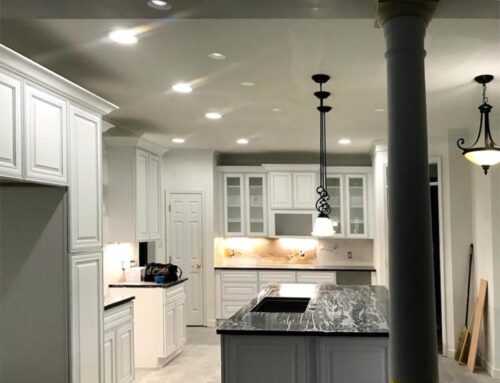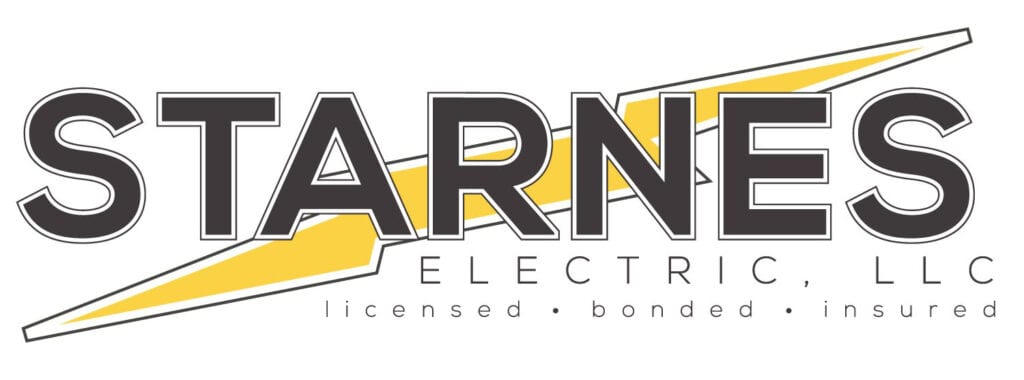Tackling electrical repairs around the house can be tempting for many homeowners. The allure of saving money and the satisfaction of a job well done are strong motivators. However, electrical work is fraught with potential risks and complexities that require careful consideration.
Understanding when to attempt a DIY fix and when to call in a professional electrician is crucial for ensuring safety and compliance with regulations.
What Are The Potential Risks Of DIY Electrical Repairs?
DIY electrical repairs can pose significant hazards if not done correctly. Here are the primary risks:
Risk of Electric Shock
Electric shock is the most immediate danger when attempting DIY electrical work. Even a seemingly minor mistake can result in severe injury or even death. Electrical systems are complex, and the risk of accidental shock is high without precise handling. For example, touching a live wire or incorrect wiring can lead to a dangerous situation where electricity travels through the body, causing serious harm or fatality.
Potential for Electrical Fires
Improper wiring can create conditions that lead to short circuits. These may not be immediately apparent but can manifest over time, posing a severe fire risk. Electrical fires can spread rapidly, causing extensive damage to property and putting lives in danger.
For instance, an incorrectly connected wire might overheat, igniting insulation or other flammable materials nearby. This is why precise, knowledgeable handling of electrical systems is crucial to prevent such catastrophic outcomes.
Voiding Home Insurance Policies
Many homeowners are unaware that DIY electrical repairs can void home insurance policies. Insurance companies typically require that licensed professionals perform any electrical work to ensure safety and compliance with regulations.
The insurance claim may be denied if an electrical incident occurs and it’s discovered that unlicensed work was conducted. This leaves homeowners responsible for the full cost of repairs or rebuilding, which can be financially devastating.
Legal Consequences
In many regions, performing unlicensed electrical work is illegal. Homeowners who undertake such repairs can face fines or other penalties if caught. These legal consequences highlight the importance of recognizing the limitations of DIY efforts in electrical work. Compliance with local building codes and regulations is mandatory, and failure to adhere to these can result in significant repercussions.
Importance of Professional Expertise
Understanding the limitations of DIY electrical repairs is essential for safety and compliance. While saving money by doing it yourself might be tempting, the potential risks far outweigh the benefits. Professional electricians have the necessary training, experience, and licensing to handle electrical work safely and correctly. Their expertise ensures that all work is performed to the highest standards, protecting your property and personal safety.
While DIY electrical repairs might seem cost-saving, they come with substantial risks. Electric shock, fire hazards, voided insurance policies, and legal issues are serious concerns that underscore the need for professional electrical services. Always prioritize safety and compliance by relying on licensed electricians for any electrical work.
How Can I Determine The Complexity Of An Electrical Repair Project?
Assessing the complexity of an electrical repair project involves understanding the scope of the work and your skill level. Simple tasks, such as replacing a light switch or an outlet cover, can often be safely managed by those with basic DIY skills. These tasks typically require minimal tools and have straightforward instructions available.
However, projects involving wiring, circuit breakers, or new installations are significantly more complex. For example, adding a new outlet may seem simple. Still, it involves understanding the existing wiring and ensuring it can handle the additional load without causing a short circuit or overload. Furthermore, such projects often require electrical codes and standards knowledge to ensure they are completed safely and legally.
A good rule of thumb is whether the project affects the electrical panel or involves wiring beyond the outlet or switch level. If so, it is likely too complex for a DIY approach and requires professional expertise.
When Is It Necessary To Call A Professional Electrician?
Certain situations unequivocally demand the expertise of a professional electrician to ensure safety and compliance with standards. Here are key scenarios when calling a professional is essential:
Frequent Circuit Breaker Trips
If your circuit breakers are tripping regularly, it’s a clear sign of an underlying issue that requires professional attention. This could be due to:
- Overloaded Circuits: Excessive electrical load on a circuit can cause it to trip frequently. A professional electrician can assess the load distribution and suggest ways to balance it.
- Faulty Wiring: Damaged or degraded wiring can create short circuits or other issues, necessitating a thorough inspection and repair by an expert.
- Malfunctioning Breaker: A breaker might be faulty and need replacement, which should only be done by someone with the proper knowledge and tools.
Outdated or Damaged Wiring
Homes with older electrical systems are particularly vulnerable to fire risks. Specific instances include:
- Knob-and-Tube Wiring: This wiring, seen in pre-1940s homes, is dangerous and needs updating. An expert should inspect and replace it with current wiring.
- Aluminum Wiring: Popular in the 1960s and 70s, aluminum wiring can become a fire hazard if not properly maintained or replaced.
- General Wear and Tear: Over time, all wiring can degrade. Regular inspections by a professional can identify and rectify potential issues before they become dangerous.
Electrical Projects in Wet or Damp Areas
Electricity and water are a dangerous combination, and professionals should handle projects in areas prone to moisture:
- Kitchens and Bathrooms: These spaces have high humidity and water exposure, increasing the risk of electric shock. Proper installation of GFCI (ground fault circuit interrupter) outlets and other safety measures are critical.
- Outdoor Installations: Outdoor electrical work, such as garden lighting or pool equipment, must be weatherproof and installed following strict safety protocols to prevent accidents.
Major Electrical Installations and Upgrades
When planning significant electrical installations or upgrades, professional intervention is essential:
- Panel Upgrades: Only a licensed electrician should upgrade an electrical panel to handle an increased load or modernize an old system.
- New Circuit Installations: Adding new circuits to accommodate additional outlets, appliances, or lighting fixtures requires precise knowledge of load calculations and wiring practices.
- Electrical System Inspections: Regular professional inspections can help maintain system integrity and safety, especially before major renovations or property sales.
While a knowledgeable DIYer can sometimes manage minor electrical tasks, these critical situations highlight the importance of professional expertise. Ensuring safety, compliance with regulations, and the longevity of your electrical system requires the skills and experience that only a licensed electrician can provide.
What Are The Local Regulations And Permit Requirements For Electrical Work?
Local regulations and permit requirements are crucial in determining whether a DIY electrical project is feasible. Most jurisdictions have strict codes governing electrical work to ensure safety and compliance with national standards, such as the National Electrical Code (NEC) in the United States.
For instance, major electrical projects like installing new circuits, rewiring, or upgrading electrical panels typically require permits. These permits ensure that a qualified professional will inspect the work to verify it meets safety standards. Performing such work without a permit can result in fines and complicate future home sales, as non-permitted work must often be disclosed to potential buyers.
Even for smaller projects, it’s essential to check local regulations. Some areas may have specific requirements for seemingly minor tasks, such as installing certain lighting or outlets. Before beginning any electrical project, it’s advisable to consult with your local building department to understand the necessary permits and inspections.
While DIY electrical repairs can be cost-effective and satisfying, they have significant risks and complexities. Understanding the potential hazards, assessing the project’s complexity, recognizing when to call a professional, and adhering to local regulations and permit requirements are essential to ensure electrical safety and compliance.
When in doubt, it’s always better to err on the side of caution and seek the expertise of a licensed electrician.
Why Starnes Electric LLC is Your Best Choice
Choosing Starnes Electric LLC for your electrical needs ensures you receive top-notch service from a team of licensed and experienced electricians dedicated to safety, quality, and customer satisfaction. Our extensive expertise allows us to handle any job efficiently, from simple repairs to complex installations. We prioritize safety, adhering to stringent protocols, and using high-quality materials to protect clients and ensure long-lasting systems.
Our commitment to quality workmanship means every detail is meticulously managed, delivering reliable and aesthetically pleasing results. With transparent pricing and no hidden fees, we provide competitive rates, such as outlet installations ranging from $150 to $300, circuit breaker replacements from $200 to $600, and electrical panel upgrades starting at $1,500.
Exceptional customer service is our hallmark; we communicate, address concerns promptly, and build lasting client relationships—Trust Starnes Electric LLC for reliable, high-quality electrical services.
Frequently Asked Questions
How Much Does It Cost to Install a New Outlet?
The cost to install a new outlet typically ranges from $150 to $300, depending on the complexity of the job and the type of outlet required. This includes labor and materials. The cost may be higher for more specialized outlets, such as GFCI outlets for kitchens and bathrooms.
What Should I Do If My Circuit Breaker Keeps Tripping?
An overloaded circuit or damaged wiring could cause frequent circuit breaker trips. Although turning off and then back on again may temporarily repair the problem, you should have a licensed electrician look at your system to find out what’s wrong and fix it. Ignoring this problem could result in electric fires or appliance damage.
Do I Need a Permit for Electrical Work?
Most major electrical projects require permits to ensure the work complies with local building codes and safety standards. At Starnes Electric LLC, we handle the permitting process for you, ensuring all work is inspected and approved by the relevant authorities. This not only guarantees safety but also protects the value of your property.
How Can I Tell If My Electrical System Is Outdated?
Signs of an outdated electrical system include frequent circuit breaker trips, flickering lights, and outlets that feel warm to the touch. Older homes with knob-and-tube wiring or aluminum wiring are particularly at risk. If you notice any of these issues, contacting a professional electrician is crucial to assess and update your system.
Ready for Reliable Electrical Services? Contact Us Today!
Starnes Electric LLC is committed to providing exceptional electrical services prioritizing safety, quality, and customer satisfaction. Whether you need a minor repair or a major installation, our experienced team is here to help.
Get Started with Starnes Electric LLC Today!
Only put off fixing an electrical problem once it becomes out of hand. Call Starnes Electric LLC now for more information or to set up an appointment. If you have any electrical problems, our helpful and educated staff is here to help.
For additional information, please get in touch with us at (803) 280-3510 or visit https://starneselectricllc.com/.

